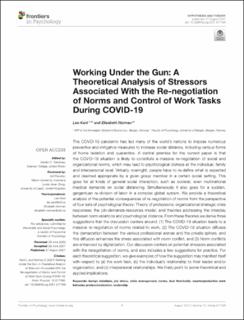| dc.contributor.author | Kant, Leo | |
| dc.contributor.author | Norman, Elisabeth | |
| dc.date.accessioned | 2022-01-27T14:35:58Z | |
| dc.date.available | 2022-01-27T14:35:58Z | |
| dc.date.created | 2021-09-23T12:36:47Z | |
| dc.date.issued | 2021-08-27 | |
| dc.identifier.issn | 1664-1078 | |
| dc.identifier.uri | https://hdl.handle.net/11250/2893449 | |
| dc.description.abstract | The COVID-19 pandemic has led many of the world's nations to impose numerous preventive and mitigative measures to increase social distance, including various forms of home isolation and quarantine. A central premise for the current paper is that the COVID-19 situation is likely to constitute a massive re-negotiation of social and organizational norms, which may lead to psychological distress at the individual, family and interpersonal level. Virtually overnight, people have to re-define what is expected and deemed appropriate by a given group member in a certain social setting. This goes for all kinds of general social interaction, such as societal, even multinational medical demands on social distancing. Simultaneously it also goes for a sudden, gargantuan re-division of labor in a complex global system. We provide a theoretical analysis of the potential consequences of re-negotiation of norms from the perspective of four sets of psychological theory: Theory of professions; organizational strategic crisis responses; the job-demands-resources model; and theories addressing the interplay between norm violations and psychological distance. From these theories we derive three suggestions that the discussion centers around: (1) The COVID-19 situation leads to a massive re-negotiation of norms related to work, (2) The COVID-19 situation diffuses the demarcation between the various professional arenas and the private sphere, and this diffusion enhances the stress associated with norm conflict, and (3) Norm conflicts are enhanced by digitalization. Our discussion centers on potential stressors associated with the renegotiation of norms, and also includes a few suggestions for practice. For each theoretical suggestion, we give examples of how the suggestion may manifest itself with respect to (a) the work task, (b) the individual's relationship to their leader and/or organization, and (c) interpersonal relationships. We finally point to some theoretical and applied implications. | en_US |
| dc.language.iso | eng | en_US |
| dc.publisher | Frontiers | en_US |
| dc.rights | Navngivelse 4.0 Internasjonal | * |
| dc.rights.uri | http://creativecommons.org/licenses/by/4.0/deed.no | * |
| dc.title | Working Under the Gun: A Theoretical Analysis of Stressors Associated With the Re-negotiation of Norms and Control of Work Tasks During COVID-19 | en_US |
| dc.type | Journal article | en_US |
| dc.type | Peer reviewed | en_US |
| dc.description.version | publishedVersion | en_US |
| dc.rights.holder | Copyright 2021 the authors | en_US |
| dc.source.articlenumber | 577769 | en_US |
| cristin.ispublished | true | |
| cristin.fulltext | original | |
| cristin.qualitycode | 1 | |
| dc.identifier.doi | 10.3389/fpsyg.2021.577769 | |
| dc.identifier.cristin | 1937605 | |
| dc.source.journal | Frontiers in Psychology | en_US |
| dc.identifier.citation | Frontiers in Psychology. 2021, 12, 577769. | en_US |
| dc.source.volume | 12 | en_US |

